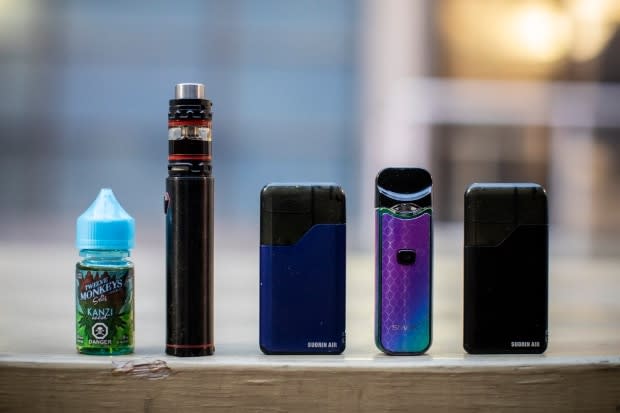B.C. to announce new rules to curb youth vaping as public health concerns increase
The provincial government is set to announce wide-ranging regulations on vaping products in B.C. on Thursday to help deal with skyrocketing youth vaping.
It is expected to be the most substantive plan in Canada thus far.
The announcement will be made by not one, but three cabinet ministers: Health Minister Adrian Dix, Education Minister Rob Fleming and Finance Minister Carole James in Victoria.
In previous correspondence with the CBC weeks ago, Health Ministry spokesman Jean-Marc Prevost said "B.C. will be taking action — the first of its kind in Canada."
"In response to vaping, and the emerging public health issue, we have been preparing our action plan, and will be announcing it shortly. The plan will be two-fold, addressing vaping through engagement and education, as well as through regulatory changes and by tightening access to vaping products."

Though current law in Canada restricts the sale of vaping products to those 19 or older, thousands of youngsters are acquiring them, using them and selling them in schools.
What was designed as a smoking cessation tool is instead getting people hooked on nicotine and is being used as a vehicle for cannabis.
The liquid that is vapourized is sold in a variety of flavours ranging from bubble gum to mint and may not always contain nicotine, but has high appeal for youngsters.
According to information provided by the Vancouver School Board, vaping can affect young brain development causing emotional "irregulation," mood swings and increased anxiety.
When the product was first taking off, its downside wasn't readily apparent.
"It got a real toehold and spread very quickly partly because even large health organizations weren't sounding the alarm in the early days," says Art Steinmann, manager of substance use health promotion for the Vancouver School Board.
But experts now worry the dangers are still largely unknown, unlike the well-established health risks from cigarettes following decades of research.
Vaping almost certainly has harmful effects. We don't fully understand the magnitude of those harmful effects at this point, we will need long-term studies," said Dr. Milan Khara, a physician with the Smoking Cessation Clinic at Vancouver General Hospital.
"Vaping, for most products, contains nicotine. Nicotine when delivered to the brain quickly has the potential to make that product highly addictive, " he said in an interview.
"Young brains are potentially vulnerable to the harmful effects of nicotine and that can cause problems with concentration and memory and development of that brain."
Of concern, too, are the unknown compounds in vaping liquid that change when they are heated in the devices.
There have been more than 2,000 cases of severe lung injury in the United States in the past few months related to vaping THC, a compound in cannabis that produces its high.
In September, Dr. Bonnie Henry, B.C.'s provincial health officer announced that physicians are now required to report cases of severe pulmonary disease associated with vaping to their regional health authorities.
The B.C. Centre for Disease Control is collecting the data.

